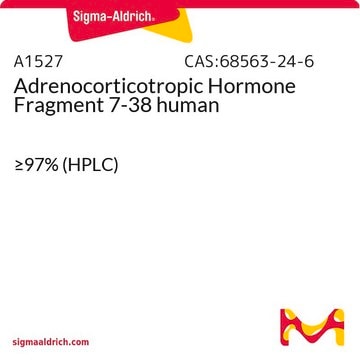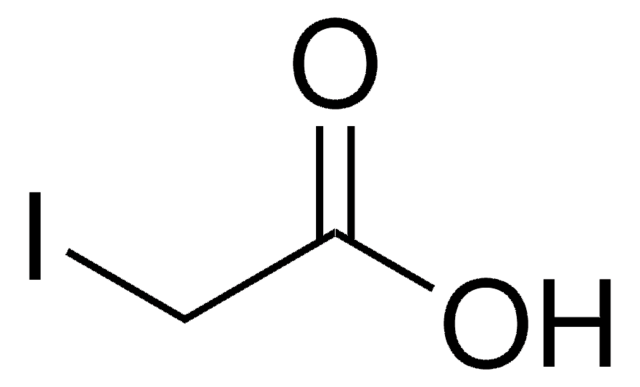A0673
Adrenocorticotropic Hormone Fragment 18-39 human
≥97% (HPLC)
Synonym(s):
CLIP
About This Item
Recommended Products
sterility
non-sterile
Quality Level
Assay
≥97% (HPLC)
form
powder
UniProt accession no.
storage temp.
−20°C
SMILES string
CC(C)CC(NC(=O)C1CCCN1C(=O)C(Cc2ccccc2)NC(=O)C(C)NC(=O)C(CCC(O)=O)NC(=O)C(C)NC(=O)C(CO)NC(=O)C(CCC(O)=O)NC(=O)C(CC(O)=O)NC(=O)C(CCC(O)=O)NC(=O)C(C)NC(=O)CNC(=O)C(CC(N)=O)NC(=O)C3CCCN3C(=O)C(Cc4ccc(O)cc4)NC(=O)C(NC(=O)C(CCCCN)NC(=O)C(NC(=O)C5CCCN5C(=O)C(N)CCCNC(N)=N)C(C)C)C(C)C)C(=O)NC(CCC(O)=O)C(=O)NC(Cc6ccccc6)C(O)=O
InChI
1S/C112H165N27O36/c1-56(2)48-72(100(163)125-70(37-41-86(148)149)97(160)133-77(111(174)175)51-63-24-14-11-15-25-63)129-103(166)79-28-20-46-138(79)109(172)75(49-62-22-12-10-13-23-62)131-93(156)61(9)121-95(158)68(35-39-84(144)145)123-92(155)60(8)122-102(165)78(55-140)134-98(161)71(38-42-87(150)151)126-101(164)74(53-88(152)153)128-96(159)69(36-40-85(146)147)124-91(154)59(7)120-83(143)54-119-94(157)73(52-82(115)142)130-104(167)80-29-21-47-139(80)110(173)76(50-64-31-33-65(141)34-32-64)132-107(170)89(57(3)4)135-99(162)67(27-16-17-43-113)127-106(169)90(58(5)6)136-105(168)81-30-19-45-137(81)108(171)66(114)26-18-44-118-112(116)117/h10-15,22-25,31-34,56-61,66-81,89-90,140-141H,16-21,26-30,35-55,113-114H2,1-9H3,(H2,115,142)(H,119,157)(H,120,143)(H,121,158)(H,122,165)(H,123,155)(H,124,154)(H,125,163)(H,126,164)(H,127,169)(H,128,159)(H,129,166)(H,130,167)(H,131,156)(H,132,170)(H,133,160)(H,134,161)(H,135,162)(H,136,168)(H,144,145)(H,146,147)(H,148,149)(H,150,151)(H,152,153)(H,174,175)(H4,116,117,118)
InChI key
ZYDMZKPAPSZILB-UHFFFAOYSA-N
Gene Information
human ... POMC(5443)
Looking for similar products? Visit Product Comparison Guide
Amino Acid Sequence
General description
Application
Biochem/physiol Actions
Other Notes
Storage Class Code
11 - Combustible Solids
WGK
WGK 3
Flash Point(F)
Not applicable
Flash Point(C)
Not applicable
Personal Protective Equipment
Certificates of Analysis (COA)
Search for Certificates of Analysis (COA) by entering the products Lot/Batch Number. Lot and Batch Numbers can be found on a product’s label following the words ‘Lot’ or ‘Batch’.
Already Own This Product?
Find documentation for the products that you have recently purchased in the Document Library.
Customers Also Viewed
Our team of scientists has experience in all areas of research including Life Science, Material Science, Chemical Synthesis, Chromatography, Analytical and many others.
Contact Technical Service




![[Glu1]-Fibrinopeptide B human ≥90% (HPLC)](/deepweb/assets/sigmaaldrich/product/structures/122/537/7ead5c32-cb67-4325-9ce7-66c8dec24bdd/640/7ead5c32-cb67-4325-9ce7-66c8dec24bdd.png)








